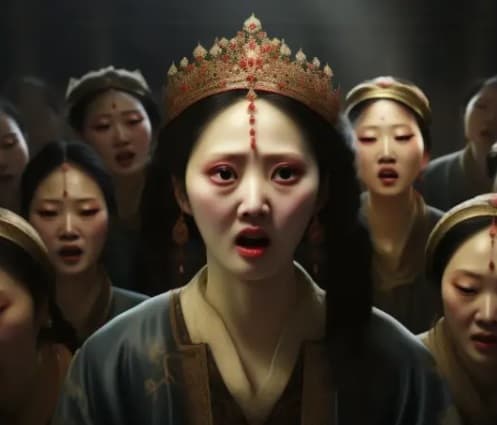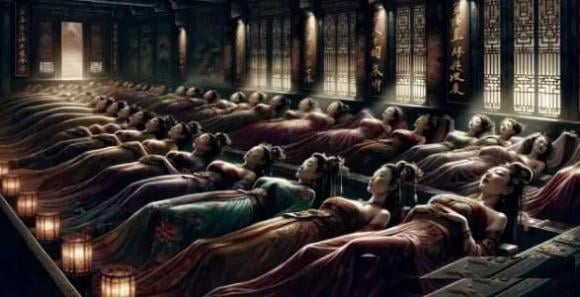Among the tombs of ancient emperors, meticulously built underground palaces still seem to narrate stories of ancient glory and grandeur. However, in that silent space, there is an indescribable sadness and despair. The once brilliant concubines have now become cold and lifeless.

When archaeologists discovered these tombs, they found a puzzling phenomenon: almost all the buried concubines had their legs spread wide. It was not a natural position before death, but a deliberate arrangement. This strange posture raised questions: What made them endure this position in their final moments?
This mystery slowly became a curious subject, and after much research and exploration, historians began to reveal the truth.
It turns out that when concubines learned that they had to die with the emperor, they were filled with fear. Many of them were in their prime, facing sudden death, and their hearts were filled with disappointment and despair. However, in an era with strict rules, they could not resist the absolute power of the emperor and could only accept their predetermined fate.
On the night of burial, the concubines were taken to a corner of the tomb. They were forced to drink poison or commit suicide, ending their lives in this way. During this process, fear and helplessness overwhelmed each person. They exerted their last strength to struggle, hoping to escape from this desperate place. However, fate had been predetermined, and in the end, they collapsed on this cold and desolate land.

The struggles of the concubines were not in vain, but a manifestation of their desire to live and resist their fate. Their legs spread wide due to strong convulsions, as if bidding farewell to this world. This unintentional gesture is a vivid depiction of the fear and despair in their souls.
This scene evokes a sense of pity for the coldness of destiny. In an era dominated by male power, women became victims, tools to maintain royal power and feudal regimes. Their lives were like lone boats that could be swallowed by the tide of history at any time.

Of course, not all concubines had to face this fate.
In fact, most concubines chosen to be buried with the emperor had no children or support. Many historians described the scene when they received the task of burial as extremely tragic: “The sound of crying shook the earth and sky, and anyone who accidentally heard it was scared to the depths of their soul.”
Following the instructions, the chosen ones would reunite with their families and loved ones. Then they would spend days mourning the deceased emperor before the burial day. During this time, they were forced to perform certain tasks to maintain their appearance. The purpose of this was for the emperor to be happy in the afterlife.
On the day of the burial, the concubines and palace maids had to dress extravagantly. They wore the most beautiful clothes and carried the most precious jewelry. In addition, they could bring their most beloved items as souvenirs, paintings, and books.
There were many ways to bury the concubines alongside the Emperor. Among them, drinking poison was considered a way that did not harm the appearance of the concubines. It was believed that drinking poison helped preserve their bodies better. In addition, hanging or swallowing mercury were also commonly used methods for burial with the emperor.
The ones to be buried alive would be starved a few days in advance to prevent extreme reactions when they were placed in the tomb. At this point, the concubines had lost the strength to resist, and their only option was to obediently follow the arrangements of fate.
Burial alive was a cruel and ruthless ritual. It took away the right to live from these concubines and palace maids for the sake of indulgence and the greed of the ruling class. Therefore, in later generations, when they realized the backwardness of this ritual, burial alive was excluded from the flow of history.





































